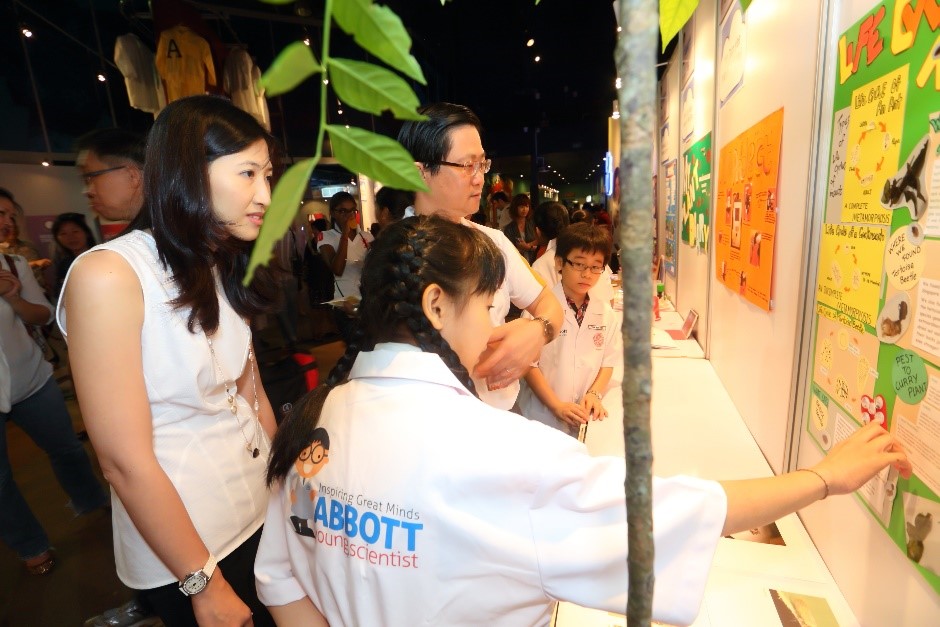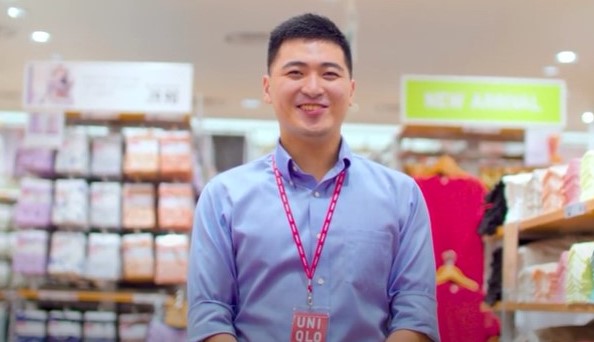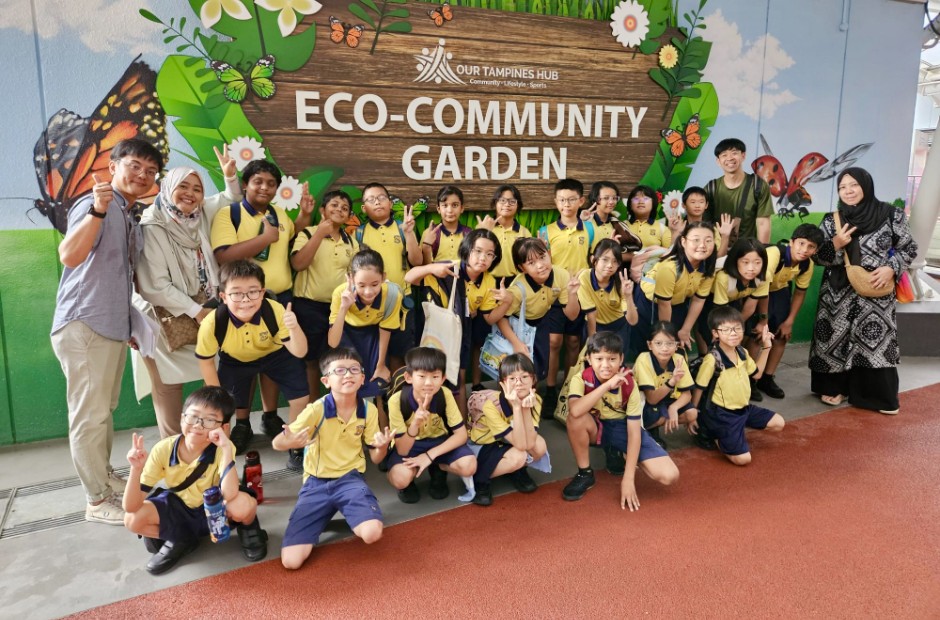Community partnerships plug our students—so used to the school environment—into the lifeblood of the community. Not only do students experience working with the community, the community can, in turn, render help to students with various needs.
MOE’s Uplift and Educational Support Branch (UESB) has been created to support students from disadvantaged families. It coordinates with schools and community partners to provide students with high needs with different kinds of opportunities, including tutoring, mentorship, programme opportunities or aid in-kind.
Science Centre Singapore’s Abbott Young Scientist Programme
The Abbott Young Scientist (AYS) Award, which began in 2013, is organised by Science Centre Singapore (SCS) and Abbott Laboratories, and is supported by MOE. Primary 4 or 5 students receive a 6-month mentorship programme from SCS’s STEM professionals on project work, science content and communication skills.
The programme aims to increase the students’ interest and knowledge in Science and Math, enabling them to communicate Science concepts and share their passion for Science, as well as learn values such as responsibility, integrity and teamwork.
 Li Hui with her 2 mentees, Jun Yee and Mikko (far right).
Li Hui with her 2 mentees, Jun Yee and Mikko (far right).
Mikko Lee, formerly from Nan Hua Primary, and Muhd Daniel Bin Ahmad, formerly from Unity Primary, are two such alumni. Both were in the AYS programme in 2013. Fast forward to today, they are current Year 2 students studying in Singapore Polytechnic (SP) and Nanyang Polytechnic (NYP), respectively, while working part-time at the SCS as Explainers.
Mikko was in P5 when her Form Teacher recommended her for the programme. She was already keen in Science, and thought it would be a good opportunity to learn more about the subject. Her mentor, Li Hui, enhanced her interest in a project work topic by bringing her to their centre’s Eco-Garden.
“My mentor showed lots of plants and insects,” Mikko says. “I remembered vividly the torch ginger flower and apple snails. That was how I became interested in life sciences.
“I really enjoyed the programme. I brought home plants and tortoise beetles from the Science Centre. Watching me do my project at home, my younger sister became interested in Science and, later, joined the AYS programme too.”
Mikko’s love for all things Science did not stop after completing the programme. In Sec 3, she opted for triple Sciences. Even when her O-Level grades were sufficient for an entry into a JC, she chose to pursue a Diploma in Food Science and Technology at SP.
“The AYS programme gave me a lot of confidence. It taught me that to pursue what I want, I only needed to have interest and passion and, of course, determination.”
Li Hui, who is from SCS’s Physical Sciences team and has years of teaching experience, says her aim is for her mentees to enjoy Science. “I typically give them lots of leeway. There’s no fixed direction. My role is to support them in their journey of discovery, facilitate their process, help them understand that learning Science is not that hard.”
One of the programme highlights is a presentation that the students give in front of an audience, which includes their family members. This is made possible through much training and guidance from the mentors. As Mikko was one of Li Hui’s more outspoken students, her presentation was less of an issue for her than it is for Daniel, who was more introverted.
 Young Daniel doing his research at the Science Centre Singapore.
Young Daniel doing his research at the Science Centre Singapore.
Currently studying Molecular Biotechnology in NYP, Daniel says, “I was quite shy before and didn’t talk much. But with the help of my mentor, she has given me confidence and trust. She’s a person I look up to – how she presents, how she talks to colleagues and the public. She gives me confidence and trust; that helped me grow as a person, to be responsible, take charge and be diligent.”
Everlyne Tan, his mentor who works in SCS’s Gallery Programmes Group, concurs about Daniel’s shyness. “Previously, when I asked him any questions, he would answer in short phrases. I had to prod him a lot. Now, his confidence has blossomed from when he first joined us. It’s very heart-warming that what we do touch lives.”
Often, the mentors will let their mentees sit beside them while they carry on with their work. The up-close immersion is an eye-opener for these young children, including Daniel. “When I first entered the Science Centre’s office,” he recalls, “I was quite overwhelmed. There were so many STEM professionals. They knew a lot of things about different things, and everyone seems to know what they do. Yet, they made time to teach and interact with me.”
Since their mentorship ended, Mikko and Daniel have been back to SCS to emcee and share their experiences with fellow awardees at AYS events. Both are also currently working as part-time SCS Explainers – they help set up exhibitor booths to educate the public, assist in SCS shows and engage with visitors.
“One of the things I liked to do during the programme was looking through the microscope and seeing cute, tiny things moving around under the lens,” Daniel explains.
“Although my school also has microscopes, the ones at Science Centre were much more powerful. Soon, I realised I had to step out of my comfort zone and grasp the opportunities given to me. I had to stop being shy, ask more questions, interact more. I was being given a special ticket to learn from the best.
“I realised I was being directed towards my passion. I was so young then and found some things challenging. But I learnt that I can’t just stop with what I know and think my knowledge is enough. I’ve got to continue, to learn more. I wanted to be better not for others, but for myself.”
Heartware Network
Heartware Network is a non-profit, ground-up local organisation that aims to instil strong character in youths. Having been around for 20 years, it focuses on youth leadership, development and entrepreneurship.
Its Tuition Programme supports disadvantaged primary school students by enlisting youth volunteers aged 17 and above, mainly from junior college and IP schools, by offering tuition and mentorship. Heartware ensures there is gender-pairing, with each youth paired to a maximum of 2 children. These youths support the children academically with a commitment of 3 school terms, and share teachable life skills, such as time and stress management, having more discipline and good homework habits.
Heartware Network’s executive director, Ms Tan See Leng, says, “Before Covid-19, our youth volunteers would go to the students’ primary school to tutor them once a week. During the circuit breaker, our youths moved the tutoring online, checking up on the children on a regular basis. Our youth volunteers don’t just provide tuition to these children but befriend them, and are available if the children need to have someone to talk to.”

Chua Pei Rui, a Heartware befriender volunteer from River Valley High School.
Chua Pei Rui is a JC1 student from River Valley High School who is one of the youth volunteers. She tutors 2 P6 students from St. Anthony’s Primary, Nur Ezalyna and Ramona. It was during an assembly talk by Heartware Network that she first learnt about the programme. Keen to help, she decided to sign up. “I thought it would be fun and interesting to help my juniors in primary school.
“Before I could join the programme, I had to attend mock sessions, role-playing in groups of 3 to 5, where interviewers gave the participants scenario-based situations and we had to know how to respond. One example was when our tutees were not paying attention during our tutoring or were simply not interested.
“Now, I have been in the programme for a few months. Each weekly session involves a quick chat between me and my tutees to check on how they are. I will also ask them if they have finished their homework, if they need help with any subject. Sometimes, they will talk to me about things other than homework.”
Nur Ezalyna, who is doing her PSLE this year, found the programme useful, especially during the circuit breaker period when she was unsure if she could cope at home without her teachers around. By arranging for Pei Rui to tutor her, she gained her confidence in her homework.
“If I faced difficult questions with my homework in Math, Science or English, I would ask my tutor, Pei Rui, on how to solve them, and she would help me. Sometimes, she would pose challenging questions to me to test my understanding.
With her help and having to be more independent during Home-based Learning, and especially when I don’t have anyone at home to teach me, I have learnt to focus better on my own.”
The Rice Company Ltd.
 Drawing by Naval Base Primary School students done during a TRCL art module to thank Singapore’s medical professionals for their hard work during the pandemic. Photo by TRCL.
Drawing by Naval Base Primary School students done during a TRCL art module to thank Singapore’s medical professionals for their hard work during the pandemic. Photo by TRCL.
The Rice Company Ltd. (TRCL) is a not-for-profit arts organisation that seeks to build an arts ecosystem to benefit youths and children in the local community, particularly those from a disadvantaged background.
During the circuit breaker, TRCL partnered selected schools to provide free online modules in art, music and sports under its #ENGAGED programme to students returning to school during the full HBL period. These are students in primary and secondary schools who have been identified as having family members working in essential services or are particularly vulnerable and requires additional school support.
Altogether, there are 13 standalone, one-hour TRCL modules that students can choose based on their interests. Each module consists of 30 minutes of a video tutorial followed by 30 minutes of online engagement with a TRCL tutor. In total, 300 students from 13 schools took part in the modules.
One such student is Serangoon Garden Secondary’s May Lim. Under the school’s HOPE@SGSS programme, she was able to be placed in a safe, school environment when her classmates were at home during full HBL. She was given breakfasts and lunches, access to school facilities (i.e. computer lab), recreational sports and games and TRCL modules. Some of the modules she took were in yoga, caricature drawing and e-sports, which she found interesting.

May Lim from Serangoon Garden Secondary School.
“Being able to come to school helped me keep to a routine as much as possible,” May says. “I could ask the teachers directly for help in terms of my learning. Also, I enjoyed the interactions with my peers, teachers and school counsellors.”
A Sec 3N(A) student, May is the youngest in her family. Her brother, 20, studies in LaSalle, her sister, 47, works as an administrator in a PCF Kindergarten and her widowed mother is currently unemployed due to her worsening health condition.
“We need help with my mother’s medical bills and surgery costs,” May adds. “Through a social worker, we are applying for financial assistance.” In addition, she was provided food supplies such as rice, milk, noodles, biscuits and tea/coffee from The Food Bank Singapore, a non-governmental organisation and community partner.
“But because I had support from the adults in school and community partners,” May says. “I was able to cope better during this difficult period, which I am grateful for.”






.jpg)